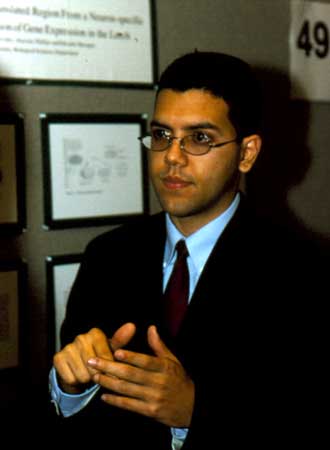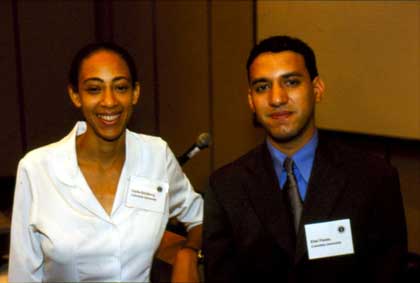
|
|
Jaime Maldinado, a rising senior at the University of Puerto Rico with the poster exhibit of his summer research gets ready to present his work at the Leadership Alliance annual national symposium.
|
Summer in New York was much more than a pleasant vacation for the 15 undergraduate students who participated in the Graduate School of Arts and Sciences' Undergraduate Student Research Program (SRP) for Students from Historically Underrepresented Groups. For them, this past summer in the great metropolis included graduate-level research with faculty mentors in the labs and libraries of Columbia University.
"Graduate school is not only a distinctive enterprise, but also a dynamic process during which students' interests often shift as they contemplate the individual attraction of different professions," said Dr. Eduardo Macagno, dean of the Graduate School of Arts and Sciences. GSAS sponsors the SRP through its Office of Minority Affairs. "Our summer program offers undergraduate students not only the experience of graduate-level research in optimum academic settings, but also exposure to the personnel, environment and work ethic of research investigation."
The GSAS program, in cooperation with the Leadership Alliance's Summer Research Early Identification Program (SR-EIP) and the Trinitas Foundation, hosted 15 undergraduate students from Columbia College, Barnard and nine colleges from around the country. "It is a part of the requirements of the University of Puerto Rico that students do a summer internship in the United States. I was very excited to come to Columbia University, which has one of the greatest programs in biological science, to do research," said Jaime Maldonado. A biology major with a minor in psychology at UPR, Jaime worked in Dr. Macagno's lab this summer on an on-going research project isolating a certain type of DNA in the nervous systems of leeches.
"It was a great experience; my mentor was great, and I got to do different kinds of research," said Jaime. "I was not treated like an undergraduate student, and maybe that's the best way to teach undergraduates about graduate school. Dr. Macagno was very supportive and patient. He allowed me to express my ideas, but he also wanted me to think and analyze for myself."
This year GSAS required their summer interns to write a paper on their research results as well as to prepare presentations (with visual aides) for a symposium before their faculty advisors, graduate students and peers here at Columbia and for the Leadership Alliance national symposium of approximately 200 interns and senior researchers from academia and industry who participated in Alliance supported summer programs.
"When you are a graduate student, you write a lot of papers, and I think its good to have an idea of what that will be like," said Jaime. "In my case. I changed my work three times as new ideas kept coming to me. I read a lot, and writing things down helped me work through my ideas."
Jaime enjoyed his summer in New York City and the new relationships he developed with the people in the lab and the other summer interns. "I was in New York City once before when I was a child, but this time I really got to enjoy the people, the music and the sights of the city." he said. "Also, I think summer internships should always have a balance between work and life if they are to help us as people. This internship gave me the chance to work and to also hang out with people and share experiences. Now I have good friends that I will try to keep in touch with."
"The Summer Research Program was run a little differently this year in terms of our philosophy and goals, said Sharon Gamble, director of the GSAS Office of Minority Affairs and the Summer Research Program. "It is our goal that the SRP simulate the graduate school experience. From day one, students are told that the goal is to prepare them for the rigors and joys of doctoral study from the application process through the mentored research to the mandatory workshops that our interns attend. We take a balanced cross section of minority students who apply through the Leadership Alliance and who apply directly to GSAS Summer Research Program."
The GSAS summer intern program is highly competitive with applicants far exceeding the number of available slots. "We select students who show a strong inclination toward scholarly research and a definite interest in Columbia University. We are not interested in students who think it would be nice to spend the summer in New York City," said Gamble. "We are here to give these undergraduate students a feeling for what graduate school will be like and to make sure they understand what Columbia has to offer."

|
|
Carla Goldberg and Eliel Flores, both rising seniors at Columbia College.
|
For Carla Goldberg, an African-American and rising senior majoring in computer science here at Columbia, summer in New York was nothing new. She was born and raised upstate and in Farmingdale. However, the research experience the internship provided was very valuable. "I learned a lot more about computers and that was very important to me, she said. "I was a biology/premed major, but I think that decision to become a doctor was not based on what I wanted but what others wanted for me. I got into computers because I like the challenge of identifying a problem and working through it to its conclusion and seeing the results."
Carla's research centered on thin-client computer platforms (computer with out internal or external drives that rely on a server for their resources). She plans to graduate from Columbia next year but does not know what kind of research she wants to pursue in graduate school. So, she will probably take some time off to work in industry before going on in higher education.
"I enjoyed the whole internship," she said. "The interns were a good group; I met other people doing computer research in the lab, and I enjoyed getting out of New York for a while to present at the Leadership Alliance symposium in Washington, DC. I made some valuable contacts there."
Right now, she is the designer, creator and webmaster of the Columbia University Gospel Choir's web page as well as a member in the alto section. "My job is just to upgrade and maintain the site. We are still a baby organization of just about four years. We've preformed in Lerner Hall, the Miller Theater and the SIPA building." That's quite a step up from their first performances given in classrooms, she added.
"This was really a nice group of students," said Cynthia Duarte, SRP coordinator and a fifth-year graduate student in the Sociology Department here at Columbia. "I expected them to be brilliant and have credentials - the fact that they got into this program meant that they are bright, energetic people from home institutions that believe in them. What I hadn't expected was that they would be such nice people! They looked out for each other all summer."
Besides the weekly seminars, the GSAS interns had several other requirements to fulfill. "Because we really wanted to simulate the graduate research project experience, the students had to read a lot and keep lab hours comparable to a first-year graduate student. They each had to bring us their own research idea; then, the professors who mentored them would help them clarify those ideas. Most worked on their own original projects, however some found that their faculty mentor's research really interested them so they participated in on-going research. This was especially true of the Columbia College students.
"We used the seminars to check on their progress and to bring them together so that they could form their own bonds for future networking. We also reviewed the graduate application process with them, advised them on preparing for the GRE and invited speakers from the faculty, corporations and graduate students to discuss their personal journeys to and through graduate school. It is a rigorous program, but many of these students are naturally charismatic and charming. I wanted to make sure that they didn't sit back on that charm - they all had to attempt original academic thought."
Besides the weekly seminars/dinners and their individual research, the interns were required to do a major paper about their research. The paper was presented (with visual aides) at a Columbia University seminar before their peers and the faculty and at the Leadership Alliance annual national symposium before 300 other interns, faculty and industry investigators from around the country.
|
